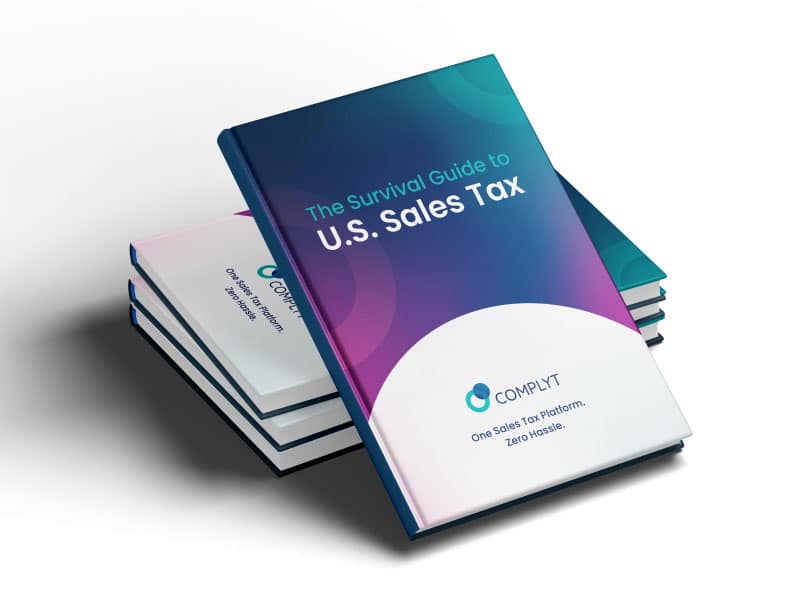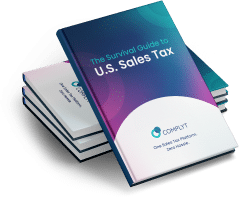What is the sales tax rate in Alabama?
The general state sales tax in Alabama is 4%, but as with most states, sales tax rates in Alabama vary from city to city, with different jurisdictions imposing their own rates on top of that 4% state rate. That means that sales tax generally ranges between 4% and 11%.
Alabama does, however, apply separate rates on a number of unique transactions, such as sales tax on farm-related purchases, which is 1.5%, while automotive purchases are 2%.
When should your business collect Sales Tax in Alabama?
If your business has a substantial presence, or nexus, in Alabama, you’re required to collect and remit sales tax. It’s as simple as that.
Now this presence can be a physical storefront, warehouse, or even attendance at trade shows in the state. For online sellers and businesses conducting businesses across state lines, if you exceed certain revenue or transaction thresholds, you may also have an economic nexus. And this is where it gets tricky.
What is an Alabama Physical Sales Tax Nexus?
A physical nexus means a business has, in some way, established a physical presence within a state through its business activity. In sales tax parlance, a “nexus” refers to a significant presence or connection of a business within a state. In Alabama, as in other states, a physical nexus is what mandates a company to collect and remit state sales tax.
But what constitutes a physical nexus in Alabama?
Your Sales Tax Physical Nexus Checklist for Alabama:
Physical Location: If your business operates out of a storefront, office, warehouse, or other physical space in Alabama, that’s a direct establishment of a physical nexus.
Personnel: Employing residents of Alabama, whether they’re full-time, part-time, or even contract workers, creates a nexus. This includes salespeople, consultants, or representatives.
Inventory: Using a fulfillment center or a warehouse to store goods in Alabama? Even if you don’t own the facility, your stored inventory can establish a nexus.
Affiliates: Affiliate relationships can sometimes establish a nexus. If you have a referral program where Alabama residents can earn commissions by referring customers, this could create a physical nexus under certain conditions.
Short-Term Physical Presence: Being present in the state for trade shows, craft fairs, or any temporary business activities can establish a nexus, but there are sometimes thresholds. For instance, attending just one trade show might not create a nexus, but multiple events in a year might.
Drop Shipping: If you’re an Alabama retailer and use a drop shipper from the state to deliver goods to Alabama customers, this can create a nexus.
It’s crucial to understand these criteria because if you establish a physical nexus in Alabama, you’re legally obligated to collect and remit sales tax from your Alabama customers. Non-compliance can lead to penalties, interest, and other legal ramifications. A big ouch that can be avoided.
What is the Alabama Economic Nexus Threshold?
Economic nexus pertains to the connection a business has with a state, purely based on the volume of its sales or the number of transactions, regardless of its physical presence. For many states, the rise of online sales prompted them to establish these economic nexus standards, following the U.S. Supreme Court’s South Dakota v. Wayfair decision in 2018.
In Alabama, the economic nexus threshold is set at $250,000 in gross sales annually. This means that if a remote seller, even without any physical presence in Alabama, has over $250,000 in sales to Alabama consumers, they would be obligated to register for, collect, and remit sales tax.
Monitoring this threshold is especially important for online sellers who could trigger an economic nexus in Alabama even though they have no physical connection to the state whatsoever.
Which services are taxable in Alabama?
In Alabama, just like in most states, sales tax generally applies to the sale of tangible personal property. However, certain services are also subject to sales tax.
Here are a few examples of taxable service in Alabama:
- Repair and installation services for tangible personal property.
- Dry cleaning and laundry services.
- Lodging services, including hotel and motel stays.
- Automobile leasing and rentals.
- Pest control services.
- Storage and moving services.
- Amusement and recreation-related services.
However, services such as medical care, educational classes, and certain professional services (like accounting or legal services) are typically exempt from sales tax.
So businesses that provide services in Alabama should carefully evaluate which of their offerings might be subject to sales tax.
How do I Calculate Sales Tax on Products?
To calculate sales tax, simply multiply the sales amount by the combined state and local rate.
In Alabama, sales tax is generally applied to the sale of all tangible personal property by businesses with a sales tax nexus in the state. And while the state sales tax may be a low 4%, the overall sales tax chargeable takes a bit more calculation.
The City of Alabaster, for example, requires sellers to collect a general sales tax of 10%, which is made up as follows: State of Alabama= 4%, Shelby County= 1%, and City of Alabaster= 5%.
So a $100 product would sell for $110 in the City of Alabaster.
How much is the Alabama clothing tax?
Clothing falls under the general Alabama sales tax rate of 4%, plus local rates that can result in clothing sales tax of up to 11%. As such, retailers need to calculate and charge sales tax accurately for all clothing sales.
Are there sales tax holidays in Alabama?
A sales tax holiday aimed specifically at back-to-school purchases starts on the third Friday in July and ends the following Sunday. Alabama also offers a Severe Weather Preparedness in February, spread over the last weekend of the month.
Does Alabama Charge Online Sales Tax?
Alabama is one of the few states that does levy sales tax on digital goods such as eBooks and other downloadable digital products.
When it comes to the taxability of digital service, such as Software as a Service (SaaS) products, the water gets a bit murky.
Does my Business Need to Charge Sales Tax for SaaS in Alabama?
Services such as the licensing of software and SaaS are generally taxable in Alabama, which makes it vital for SaaS providers to check their obligations in each county they have a nexus in and make Alabama SaaS sales tax a part of their compliance journey.
How can a business get a sales tax permit in Alabama?
Businesses can apply for a sales tax permit directly with the Alabama Department of Revenue through the My Alabama Taxes online system. There’s usually no cost for the permit, but there may be other business-related fees. So be sure to pay close attention as you complete your application.
How Does Sales Tax Remittance Work in Alabama?
Collecting and remitting sales tax means setting up your business operations and sales systems to charge customers the correct rate. This includes understanding multiple rates if you operate in different localities within the state.
Most importantly, you need to know when to remit taxes and when to file your returns, otherwise you’ll still end up non-compliant even if you did collect sales tax.
Alabama Tax Return Due Dates Explained
Depending on the amount you owe, you may file monthly, quarterly, or annually. Check the Alabama Department of Revenue’s schedule for specific due dates.
What is the required frequency for sales tax returns in Alabama?
This depends on the volume of your sales. High-volume businesses might file monthly, while smaller businesses might be on a quarterly or yearly schedule.
Sales tax payments are generally due on the 20th day of the month following the one for which the taxes were collected. And for those filing quarterly, due dates are April 20th, July 20th, October 20th, and January 20th for the previous quarter’s sales.

